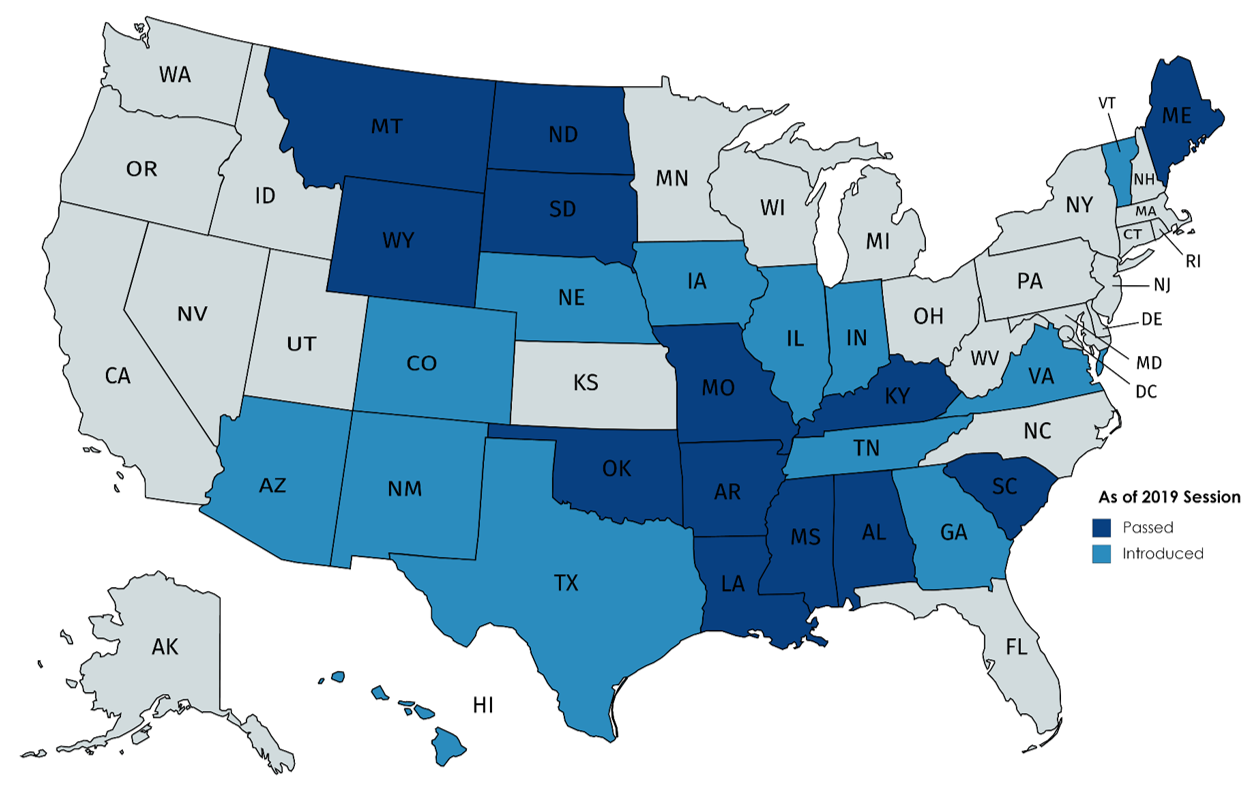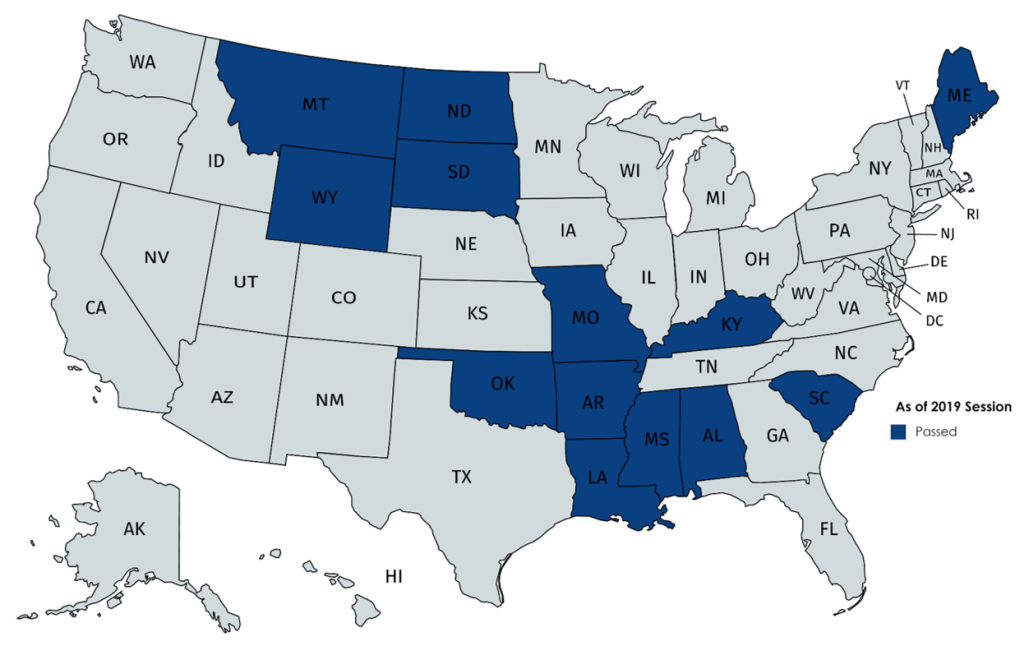 In the past calendar year, thirteen states have passed laws governing the words or phrases that can be used to identify new-to-the-market products such as new varieties of proteins (plant-based, insect-based or cell-cultured). Two of those states have also include language limiting the types of products that may bear the word “rice” on the label. This recent state legislation has brought a substantial amount of attention to this issue. In general, the statutes focus almost exclusively on meat labeling with the exceptions of Arkansas and Louisiana who also include rice. Challenges to the laws have been filed in three states so far, while similar legislation is pending in several more states and on the federal level.
In the past calendar year, thirteen states have passed laws governing the words or phrases that can be used to identify new-to-the-market products such as new varieties of proteins (plant-based, insect-based or cell-cultured). Two of those states have also include language limiting the types of products that may bear the word “rice” on the label. This recent state legislation has brought a substantial amount of attention to this issue. In general, the statutes focus almost exclusively on meat labeling with the exceptions of Arkansas and Louisiana who also include rice. Challenges to the laws have been filed in three states so far, while similar legislation is pending in several more states and on the federal level.
How the statutes work
Generally, the statutes set requirements as to the type of food product that may be advertised using specific words or phrases. So far, each statute has been some variation of “’meat’ must be a product of harvested livestock or otherwise the label will be false and misleading.” For example, Montana defines meat as the “edible flesh of an animal born and harvested for the purpose of human consumption.” Mont. Code Ann. §4.1-31-01(8). This same code section further states that cell cultured protein products must be labeled as such and that to label it as a meat food product is a misrepresentation. Id. Other states, such as Alabama, forbid any food product containing cultured animal tissue from being labeled as meat or meat food products. Ala. Code §2-17-10(d). Finally, the last group of statutes contain language broad enough to affect plant-based meat alternatives as well. Arkansas defines a meat product as “an agricultural product edible by humans and made wholly or in part from meat or another portion of a livestock, poultry, or cervid carcass.” Ark. Code Ann. §2-1-302(8).
Issues being Litigated
Several states have ongoing challenges to the recently enacted laws. Missouri, the first state to pass such a law[1], was also the first state to have their law challenged. In August 2018, The Good Food Institute, Tofurky, the Animal Legal Defense Fund and the American Civil Liberties Union of Missouri filed a joint lawsuit in the Western District of Missouri challenging the Missouri law which prohibits misrepresenting a product as “meat” if that product is “not derived from harvested production livestock or poultry.”[2] In the complaint, the plaintiffs argue that the state statute violates the Free Speech Clause of the First Amendment, the Due Process Clause of the Fourteenth Amendment, and the Dormant Commerce Clause. Currently, the judge in the case has not granted the request for injunctive relief on the basis that Tofurky was not able to show that there was a risk of prosecution under the new Missouri law, or that they would need to modify their labels to remain in compliance. The case remains pending.
An almost identical lawsuit- same plaintiffs, same challenges- has also been filed in Arkansas.[3] A motion for injunctive relief has been filed and the parties are currently waiting on a decision from the court. This decision may differ from the Missouri case because the Arkansas statute is the broader variety that also covers plant-based meat alternatives, as well as phrases that has been “used or defined historically in reference to a specific agricultural product.” Finally, a third case on similar grounds is pending in the state of Mississippi.[4]
Federal proposal
On October 28, Rep Marshall (R-KS) & Brindisi (D-NY) proposed H.R. 4881, The Real Marketing Edible Artificials Truthfully (MEAT) Act. [5] This proposal looks very similar to those passed in the states and discussed above. It would, in part, codify the definition of beef for labeling purposes. “Beef” would mean “any product containing edible meat tissue harvested in whole form from domesticated Bos indicus or Bos taurus cattle.” Further, it would require that “any imitation meat food product, beef, or beef product shall be deemed to be misbranded unless its label bears, in type of uniform size and prominence, the word ‘imitation’ immediately before or after the name of the food and a statement that clearly indicates the product is not derived from or does not contain meat.” Finally, it would give USDA the ability to initiate enforcement measures if FDA does not do so within 30 days of discovery. The bill has just been introduced and is not yet been assigned to committee.
 Conclusion
Conclusion
Thirteen state have enacted meat labeling bills, but over twenty-five bills on the topic were introduced in state legislatures across the country within the past couple of years, as well as the “Real ‘MEAT’ Act” on the federal level. The challenges in Missouri, Arkansas, and Mississippi will shape how this issue continues to evolve, but there is a strong trend that can be seen from the number of pieces of legislation that have been introduced and passed at the state level.
Other Resources:
- Enacted labeling laws: https://bit.ly/2PFg5MY
- Proposed labeling laws: https://bit.ly/2Nv3kC5
[1] Mo. Rev. Stat. § 265.494, available at https://bit.ly/33bn3xr
[2] Complaint for Declaratory and Injunctive Relief, Turtle Island Foods, SPC et al. v. Richardson, No. 18-cv-4173 (W.D. Mo. Aug. 27, 2018), available at https://bit.ly/3333xmn
[3] Ark. Code Ann §2-1-301 through §2-1-306 available at https://bit.ly/2Ojm4Et
Complaint for Declaratory and Injunctive Relief, Turtle Island Food, SPC v. Soman, No. 4:19-cv-514-KGB (E.D. Ark. July 22, 2019), available at https://bit.ly/2NuwfX3
[4] MS Code §75-35-15 available at https://bit.ly/323tUHE
Complaint for Declaratory and Injunctive Relief, Upton’s Naturals Co. et al. v. Bryant et al., No. 3:19-cv-462-HTW-LRA (S.D. Miss. July 1, 2019), available at https://bit.ly/2WpAl6M
[5] H.R. 4881- 116th Congress. Available at https://bit.ly/3675fW1
